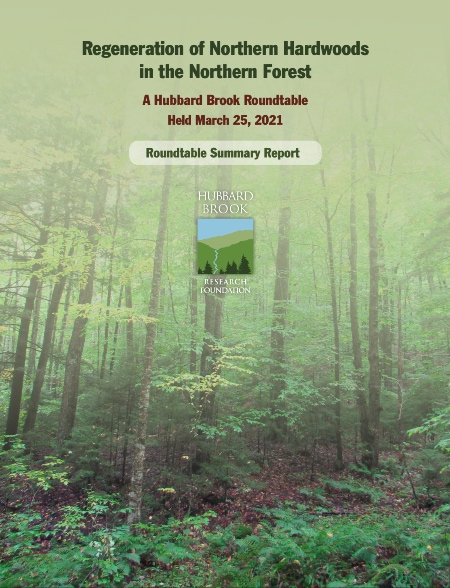Regeneration of Northern Hardwoods (2021)
What is the state of the regeneration of northern hardwoods in the Northern Forest region?
March 25, 2021
Hubbard Brook Experimental Forest
Woodstock, NH
Hubbard Brook Research Foundation convened a three-hour online dialogue event with a group of 27 foresters, natural resource managers, scientists, and students to discuss the regeneration of northern hardwoods in the Northern Forest region. Prior to the meeting, 21 participants engaged in one-on-one, semi-structured interviews with a group of student leaders, the results of which were compiled and shared in a synthesis report. Following the roundtable, 12 participants joined an optional one-hour follow-up meeting to discuss next steps.
The goals of this Hubbard Brook Roundtable were: (1) to synthesize and share knowledge and perspectives across disciplines and institutions to inform forest-related research and practice; and (2) to foster new connections and collaborations among forest researchers and practitioners in the region. The roundtable focused on concerns from both the researcher and practitioner communities about the regeneration of northern hardwood forests and the complex and interacting stressors that affect forest regeneration, including climate change, recovery from acid rain, invasive pests and diseases, past management, and herbivory.
Acknowledgments
This Hubbard Brook Roundtable was supported by a grant from Cornell University’s Engaged Opportunity program, which funded four undergraduate students in environmental science to serve on the roundtable leadership team. The roundtable was also supported by a grant to the University of Maine from the National Science Foundation: NSF RII Track-2 FEC: Leveraging Intelligent Informatics and Smart Data for Improved Understanding of Northern Forest Ecosystem Resiliency (INSPIRES), Award #1920908. The roundtable originated in projects that were supported by the National Science Foundation’s Long Term Ecological Research (LTER) program at Hubbard Brook (NSF DEB #1637685) and a National Science Foundation Advancing Informal STEM Learning (AISL) grant to advance public engagement with science (NSF DRL #1713204).

